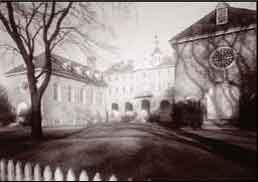Pakistani Seeks 'Pluralism'
for the World
By David Williard
 From
the moment Karim Baig came to William and Mary from the
remote Humza Valley in northern Pakistan, he has been looking
back — not from homesickness, although there is some
of that, but due to his desire to help change life-circumstances
in his own country.
From
the moment Karim Baig came to William and Mary from the
remote Humza Valley in northern Pakistan, he has been looking
back — not from homesickness, although there is some
of that, but due to his desire to help change life-circumstances
in his own country.
“I want to act as a bridge between the East and the
West as far as I can as a human being,” Baig explained.
Part of his goal is to help eliminate stereotypes held by
people in Pakistan and in the United States. “My large
goal is to lend my skills to how we can bring economic reforms
to raise the standard of life of my own people,” he
said.
Baig hopes to move toward achievement of his goal through
earning a degree in economics from the University of Lahore
and by developing an understanding of diversity at William
and Mary.
Baig is at the College under a one-semester scholarship
through US Education Foundation in Pakistan, an organization
that he described as promoting the elimination of misperceptions
between citizens of Pakistan and those of the United States.
Although he has excelled in the academic courses he has
taken at the College, it is the social lessons that have
made a lasting mark on him. He has been delighted to find
an openness at the College toward discussing pluralism and
its potential for transcending what he called “the
pressing problems” of the world.
“Say you have two gardens,” Baig said as a means
of defining pluralism. “One garden has different kinds
of flowers, and one garden has only one kind of flower.
Naturally the garden with the different flowers is the most
beautiful. Pluralism in this world is like that second garden.
Having different backgrounds, having different opinions,
having different faiths and religions is not our weakness,
it is our strength. It is our power.”
Before he arrived at the College, Baig, based on perceptions
of American life gleaned from commercial media portrayals
available in his homeland, expected to find students “self-absorbed
in their own busy lives.” He has discovered the opposite
to be true. In Williamsburg and on the campus, he has been
greeted with smiles, a simple act that he believes “empowers”
and that generates a “spirit of optimism.” A
result has been that he has freely engaged other students
and has discovered that many of them share his desire to
understand the variety of worldviews held by people of differing
backgrounds.
“I have found that people want to understand the cultures,
and I can say that William and Mary is creating an environment
for diversity and pluralism,” Baig said. “Here
we have students from all over the world who are living,
adjusting and learning a lot in this environment. This is
a good sign for the coming generation.”
Baig is scheduled to return to Pakistan after classes at
the College conclude in May. He will depart Williamsburg
with credits toward his degree in economics and with a message
for his own people. “Now I can act as an ambassador
for Pakistan. I can show my country the personal experience
about the environment of openness in America,” he
said.
In Pakistan, such openness is not always apparent, he said.
Many barriers between people are, he believes, the result
of living in a developing country. “If you are not
in a good environment, you cannot think positively,”
he explained. “You cannot think positively if you
are thinking about how to survive.” He hopes to address
that condition by helping to bring about economic reforms
to raise the standard of living.
As he prepares to leave the College, Baig’s experience
has been overwhelmingly positive, but he already can taste
a traditional Pakistani meal shared with members of his
family — “that is what I miss the most,”
he said. In fact, one concern he raises about American college
students is their apparent desire to separate themselves
from their families. “Here, when you’re a teen
or 21, you become independent; the separation of families
is very fast,” he observed. “I don’t know
if that is a weak point or a strong point, but when you
live with family, that is a strength.”
He will leave the College having made not only friends but
admirers. Among them is Tamara Sonn, Kenan Professor of
Humanities and Religious Studies at the College, who was
in Pakistan and who directed Baig to consider attending
William and Mary.
“I find it remarkable that he has fit right in brilliantly,”
Sonn said. Although the literacy rate in Pakistan is under
50 percent and the percentage of residents who attend school
is very low, she is amazed that he has been able to compete
successfully with students at what she called “one
of the best undergraduate universities in the United States.”
“It really strikes a blow at the stereotypes we have
of Muslim kids and Pakistani kids,” she said. “We
often talk about Pakistani schools as being a breeding ground
for terrorism, but he is doing beautifully.”
Baig said he has not been confronted with anti-Muslim expressions
on the College, and he staunchly denounces terrorism. “God
has created us with a tongue, not a gun,” he said.
However, he quickly steers such conversation toward the
positive. “If we increased the pace of learning about
the peoples of other societies, then we could solve these
issues,” he said. “We can have this concept
of pluralism all over the world.” (Courtesy W &
M News)
-------------------------------------------------------------------------------------

